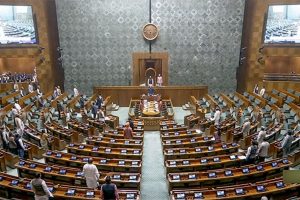The book Dwipantarer Katha: The Story of Deportation by freedom-fighter Barindra Kumar Ghosh is a historical documentation of the deportation and the stay of the prisoners in the Cellular Jail in the Andaman islands during British rule in India. The Bengali original has been adeptly translated by Amita Ray (an academic, an ace translator, a short story writer, and a poet based in Kolkata), conveying it to a wider readership. Looking back, the attempt to kill Kingsford by Indian freedom fighters Khudiram Bose and Prafulla Chaki on 30 April 1908, began an investigation that led to the arrest of Barindra in May 1908, along with other revolutionaries. In the trial that ensued, Barindra Ghosh and Ullaskar Dutta were sentenced to death, but on appeal, the death sentence was revoked. Barindra was deported to Cellular jail in Andaman along with his comrades and served life imprisonment from December 1909 to December 1920.
“Barindra Kumar Ghosh, unlike his famous and widely known elder brother Aurobindo Ghosh, is a moderately known freedom fighter among the people of Bengal and the rest of India. In this context, Amita Ray’s translation of Barindra Kumar Ghosh’s Memoir “Dwipantarer Katha,” originally written in Bengali, assumes enormous significance in terms of disseminating more information and knowledge on Indian freedom struggle and Indian revolutionaries,” writes Aneek Chatterjee in the foreword to the book. Dwipantarer Katha provides a unique entry point into the nature of crime and punishments and holds a mirror to the conditions of prisoners, reflecting on the intricacies of the functioning of prison houses in Andaman during the freedom struggle and the multifarious facets of British law and legal systems. The Memoir traces the trajectory of Barindra Kumar Ghosh as an individual, the personal moments of immense susceptibility, and even records the political views and ideas of other freedom fighters who were captivated in the Cellular Jail along with him. Further, it interrogates the power structures during the British Raj.
Advertisement
Dwipantarer Katha is an archive that provides an active observation of legal systems, power relations, and the nature of the authority of the British that regulated such structures. The Memoir showcases the journey of India as a nation—from monarchy to a democratic republic through a dark phase of colonialism—and how this changed the legal systems and the understanding of crime and punishments from ancient to modern times. History tells us the story of major characters and is unkind to minor characters. Dwipantarer Katha largely speaks of the minor characters of the Indian freedom struggle who failed to get into the history books. Through the eyes of Barindra, we come to know about Mr Barry, the Jailor, the petty officer Khoyedad Khan, Golam Rasul, the Munshi of Cellular Jail, and the various innovative, inhuman ways in which they used to inflict torture upon the revolutionaries. We also get to know about the deteriorating mental condition of the revolutionaries.
Ray’s deft translation has projected Barry as a double-headed monster with a fierce appetite for terrorising the Indian revolutionaries; she writes, “The moment Barry set out from his office for the jail, there was a stir everywhere. All the prisoners became fearfully alert; each one sat in his place obediently. The warder and petty officers stood upright in their places like rooted impossible posts, ready to make obeisance. Mr Barry, before closing the jail, took a round in the central tower. As soon as he reached a number, the cry ‘Sarkar’ was raised. Instantly, all the prisoners stood up collectively like spring dolls, and the warder and petty officers greeted him like a salute, as was the military custom! It seemed to be an affair with the German Kaizer! If all the prisoners succeeded in rising together, they were luckily saved for the day; the order to sit down was delivered, and everyone sat down without much ado. But if there was a slight delay in responding to the call for standing up by one or two of us, the consequences would be severe. We were subjected to the rigorous exercise of sitting down and standing up countless times until we were about to swoon.”
Barindra’s Memoir captures the nuances of how prison-going and sacrificing one’s career and relationships became an integral part of the protest against the colonial state. In the words of Barindra, “Life spent on a bed of roses embracing eternal spring malnourishes the backbone of humanity; the evolution of dynamic power makes a man divine; the fire of thunder is nothing but absolute truth.” Dwipantarer Katha is largely a commentary on imprisonment in its manifold forms and the colonial state’s strategy for harnessing recalcitrant subjects. Indian history needs to be rewritten. It is high time that the nation pays tribute to the not-so-known revolutionaries who offered their lives for the sake of their motherland. Translation is an art and an effective tool for the unfolding of such lesser-known facts of Indian history. Ray has adroitly captured and transferred the original tone and objective of Dwipantarer Katha into English, taking into account regional and cultural differences between the target and source languages. Three black-and-white photographs at the end of the book are a grim reminder of the carceral experiences of the Indian freedom fighters and nationalists. Prison literature is an emerging genre, and Amita Ray has done a laudable job not only as a translator but also as a conscientious citizen of India who is conscious of the history of this nation. In the annals of translation, Dwipantarer Katha has a new page to turn.











